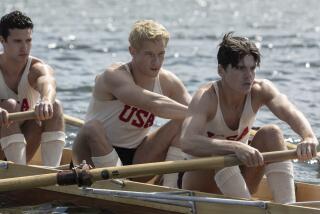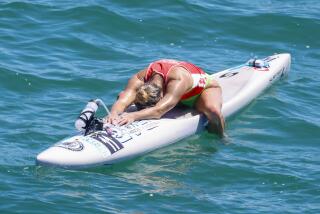Formerly Reluctant Rower Finds Himself Headed for Barcelona Games : Rowing: Aaron Pollock tried several sports before finding his niche.
- Share via
SAN DIEGO — After much prodding, the resistant rower relented.
Aaron Pollock finally figured that his credentials were credible. No longer would he have to fidget and fudge when someone asked him what he did before he rowed.
“OK. Go ahead and print it,” he agreed, sold on the disclosure idea after he was reminded that he had just made the U.S. Olympic rowing team. “I was on the badminton team in high school. Badminton was all my best friend could play, so we got together and played doubles. Actually, it was pretty fun.”
The image of the 6-foot-8, 235-pound Pollock lumbering around something as tiny as a badminton court--and he shared it at that--isn’t an easy one to conjure up.
Not that he had a lot of options. Pollock, who rowed under Doug Sanchez in 1989 and 1990 at San Diego State, had tried track and water polo at Hillsborough San Mateo High School in Northern California with few encouraging results.
“I wasn’t very athletic back then,” said Pollock, laughing at the turnabout, as he and partner John Moore of Palm Beach, Fla., and coxswain Stephen Shellans of Newberg, Ore., are America’s high hopes in the men’s pair with coxswain in Barcelona. “A coach would have had to make me a project. I wasn’t the kind of guy you’d see down the hall and say, ‘Now that’s an athlete.’ I was kind of awkward.”
Badminton might have been a good time, but watching the birdie was hardly a vehicle that would win him a college athletic scholarship--not that he expected one.
Pollock’s family isn’t remotely athletic. But when he entered SDSU in 1986, he felt compelled to do something.
He joined the rowing team his freshman year, but had to give that up because of poor grades.
“When you’re as big as I am, people expect you to excel,” he said. “I was sick of people asking me if I was a basketball, volleyball or football player. I had to do something. But more than that, I felt I had to be in the top 1% of something .”
Pollock attempted to make SDSU’s basketball and football teams. Coaches of the former passed when he peddled his skills, but he made the latter as a walk-on his sophomore year.
A rewarding experience it was not. He quit after a clash with a coach he said looked askance on players who made the team based on size and not experience. Besides, his family had other ideas.
“My dad didn’t exactly encourage me to the point that I got jazzed about (football),” Pollock said. “He suggested I go out for rowing.”
The hint wasn’t an instant hit.
“I won’t even tell you what he said when I first suggested it,” said Aaron’s father, Stanford Pollock. “I think the thing he was most against was getting up that early for practice.”
But Aaron returned to the team his junior year, since he had mild success earlier and it was the only sport where he had a notch of know-how.
“I had some experience,” he said. “When I took the strength tests as a freshman, I was the strongest guy on the team.”
Besides, Pollock believed he had something to prove. When he was a novice rower with the Aztecs, one of his teammates made a comment that stuck with him and has motivated him since.
“A teammate of mine said, ‘Jack of all trades, master of none,’ ” he said. “I think it was aimed at me, in fact, I’m sure it was. At that point I decided I wanted to do something with it.”
In 1990, after his senior year at SDSU--he went through graduation but still has a paper to finish to earn his history degree--Pollock competed in the Olympic Festival in Minneapolis and was subsequently named to the Olympic Development Camp.
“I was identified as one of the guys not out of a big college program, but with potential,” Pollock said. “I needed a lot of work on my conditioning.”
Ted Nash, one of three Olympic coaches and the one who first spotted Pollock, said he’d rather add conditioning to an athlete with courage and commitment than vice-versa. Nash liked the qualities he saw in Pollock and Moore.
“I enjoy taking kids from institutions where the rowing programs may not be that big or successful,” Nash said from Germany, where the rowing team is training before it departs for Spain. “I enjoy working with Aaron and John because they’re so eager to improve. They’re so new, yet they’re as eager as my veterans, which isn’t easy. This sport is painful. There are no timeouts or substitutions. For a new person, that takes a lot of courage.”
After a successful camp, Pollock made the bold move to Philadelphia, where some of the country’s best train. He put his goal of a law career on hold.
It was a decision Stanford Pollock embraced gingerly at first, although now he is thrilled with his son’s accomplishments.
“I used to ask Aaron when he was going to stop rowing and start working and making a real living,” Stanford said. “But he did this on his own. He set his mind to it. For a kid who was undisciplined . . .”
And inexperienced. Pollock, 24, and Moore, 27, have rowed together for two years, a smidgen of experience compared to the average nine years most of their competitors have enjoyed together.
Nash said it takes years to hone the proper skills, but Pollock and Moore have excelled quickly because of their keen interest.
“And they’re good friends,” he added. “Although they have different backgrounds, they’re very good friends, and that helps.”
Initially, Nash teamed them because of their matching 6-8, 235-pound frames. But they started winning, and their personalities played off each other so well that he saw no reason to split them up.
“John’s the leader,” Nash said. “He’s the teacher, he’s quiet. He has the ability to calm a younger person’s enthusiasm. Aaron’s so eager and excited, he gets John fired up for races that don’t seem winnable.”
Which could come in handy this summer. Nash said realistically, the 1991 national champions must shave five seconds off their best time to get to the round of six in Barcelona.
It takes approximately 275 strokes and seven minutes to cover the 2,000 meters--just over one mile--course. The race is explosive at the start, has a middle period of lower but sustained effort and concludes with an all-out sprint.
“They have the best start in the country, their middle period is in the best third and we’re working on the sprint,” Nash said.
The duo has the strength and speed down pat, but needs to improve on endurance and race tactics.
“That’s where they need to find (five seconds),” said Nash, who explained that Pollock and Moore haven’t raced enough internationally to break into the world’s top five teams--they are currently between eighth and 12th.
“In the next two weeks, we hope they will have enough improvement. They must keep their focus and not be distracted as new people to this high level. If they can achieve that, they will be more than well prepared.”
But Nash said it was silly to try and pin a medal on them . . . this year.
“The TV people always want to know why you didn’t win a gold,” he said. “Well, that’s ridiculous. If they get into the final, it will be unbelievable. A medal is off the scale.”
Moore told the Palm Beach Post he planned to retire after the summer games, but Pollock said he will wait to decide if he’s going to train for Atlanta, where the 1996 Olympics will be staged.
“I won’t retire,” Pollock said. “I don’t know about 1996. I have to see what happens. It’s such a lot of work and now I’m almost done with it.”
Before he is, Pollock is dedicating this Olympic experience to his mother, Roberta, who has been in a wheelchair since she became a quadriplegic 10 years ago. She has never seen her son compete.
“I’m dedicating this to her,” he said. “It’s one of the things that motivates me. It’s constantly on my mind.”
Should he stay motivated and continue rowing, Nash thinks Pollock could spin gold in Georgia.
“If Aaron continues and he’s committed to 1996, he’ll achieve the skills so he’ll absolutely be a contender for a gold medal,” he said.
Pollock certainly should have the support of his fiance, Elizabeth Mathiowetz, a UCLA graduate and fellow rower.
“They can row through life together,” Stanford said.
More to Read
Go beyond the scoreboard
Get the latest on L.A.'s teams in the daily Sports Report newsletter.
You may occasionally receive promotional content from the Los Angeles Times.






